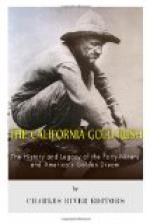The journey ordinarily required about five months, provided nothing untoward happened in the way of delay. A start in the spring therefore allowed the traveler to surmount the Sierra Nevada mountains before the first heavy snowfalls. One of the inevitable anxieties was whether or not this crossing could be safely accomplished. At first the migration was thoroughly orderly and successful. As the stories from California became more glowing, and as the fever for gold mounted higher, the pace accelerated.
A book by a man named Harlan, written in the County Farm to which his old age had brought him, gives a most interesting picture of the times. His party consisted of fourteen persons, one of whom, Harlan’s grandmother, was then ninety years old and blind! There were also two very small children. At Indian Creek in Kansas they caught up with the main body of immigrants and soon made up their train. He says: “We proceeded very happily until we reached the South Platte. Every night we young folks had a dance on the green prairie.” Game abounded, the party was in good spirits and underwent no especial hardships, and the Indian troubles furnished only sufficient excitement to keep the men interested and alert. After leaving Salt Lake, however, the passage across the desert suddenly loomed up as a terrifying thing. “We started on our passage over this desert in the early morning, trailed all next day and all night, and on the morning of the third day our guide told us that water was still twenty-five miles away. William Harlan here lost his seven yoke of oxen. The man who was in charge of them went to sleep, and the cattle turned back and recrossed the desert or perhaps died there.... Next day I started early and drove till dusk, as I wished to tire the cattle so that they would lie down and give me a chance to sleep. They would rest for two or three hours and then try to go back home to their former range.” The party won through, however, and descended into the smiling valleys of California, ninety-year-old lady and all.
These parties which were hastily got together for the mere purpose of progress soon found that they must have some sort of government to make the trip successful. A leader was generally elected to whom implicit obedience was supposed to be accorded. Among independent and hot-headed men quarrels were not infrequent. A rough sort of justice was, however, invoked by vote of the majority. Though a “split of blankets” was not unknown, usually the party went through under one leadership. Fortunate were those who possessed experienced men as leaders, or who in hiring the services of one of the numerous plains guides obtained one of genuine experience. Inexperience and graft were as fatal then as now. It can well be imagined what disaster could descend upon a camping party in a wilderness such as the Old West, amidst the enemies which that wilderness supported. It is bad enough today when inexperienced people go to camp by a lake near a farm-house. Moreover, at that time everybody was in a hurry, and many suspected that the other man was trying to obtain an advantage.




